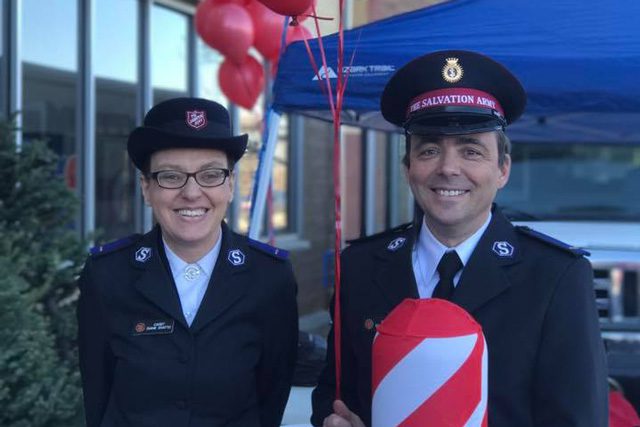By Diane Shatto, Cadet –
Intense and maturing—that describes the six-week Christmas field assignment for cadets at The Salvation Army College for Officer Training at Crestmont. No wonder it’s called an “intensive.”
My husband David and I served at the West Adams Corps in Denver, under Lts. David and Sarah Aguirre. Most of the time we helped with kettles and Angel Trees, but we also spent Thanksgiving with the homeless and got to know many of the corps congregation. Our Christian education as well as serving opportunities primarily took place in informal moments—speaking to others while counting kettle money, after church, or in quick exchanges with the corps officers.
One lesson I learned that really changed my thinking about ministry concerns the relationship between mercy and justice. I began grappling with this relationship in my 20s when I had to take an employment test, which “forced” me to choose between the two options.
I had always chosen justice. When I thought of all the people in the world who made the lives of innocent people miserable, justice seemed like the only option that showed true solidarity with the oppressed.
In recent years Colorado’s homeless population has been surging. The Salvation Army can only make a dent in serving this population. It would take real justice to change such a situation for so many. It was the same with the many families needing help at Christmas time. I was eager to help with the Angel Tree toy drive, to bring joy to children who might otherwise wake up on Christmas morning without even a single gift. All children are innocent, and again, only justice can make such a situation right, for so many.
One day, in a casual conversation with my corps officer, I mentioned how unfair life was for so many people, and how I believed the root cause for much of this was other people whose sin went unchecked, allowing them to hurt other people. Borrowing a term from the theologian Dietrich Bonhoeffer, I said, “So much of what we call mercy is ‘cheap grace.’”
My corps officer looked at me and said, “I’m so glad that God did not give up on me when I was in a lifestyle that was hurting others. I’m glad he had mercy on me.”
I said, “Well sure—I was thinking of much more terrible people who deserve justice.”
He looked at me compassionately. “Justice has already been served,” he said. “That’s what the cross was all about.”
I looked back at him in silence. He continued, “All we are left with is mercy.”
This conversation took place near the beginning of my Christmas intensive experience, and it not only changed every interaction I had with every person I encountered in Colorado, but it changed my whole philosophy of ministry.
You see, that is why Jesus came to earth in the first place. The Bible says, “I did not come to condemn the world but to save it” (John 3:17).
The world already condemned itself through its sin. God instituted a plan to save the world through his Son. Jesus came to save us from sin. The Bible says there is not one person he wants to perish (2 Peter 3:9). He is slow to anger and patient in love for all of us. Victim or predator, we are all sinners. All have sinned and come short of the glory of God (Romans 3:23). Likewise, salvation is for all of us (Romans 10:13).
I could have spent this space telling about all the programs I was involved in, the statistics for how many we served, raving about the incredible hospitality of the West Adams Corps and the Adult Rehabilitation Center that hosted us. But apart from all the programs, the most important training I had was learning about the true heart of the Christmas message: God’s grace—the most important ministry I have to give to people.











